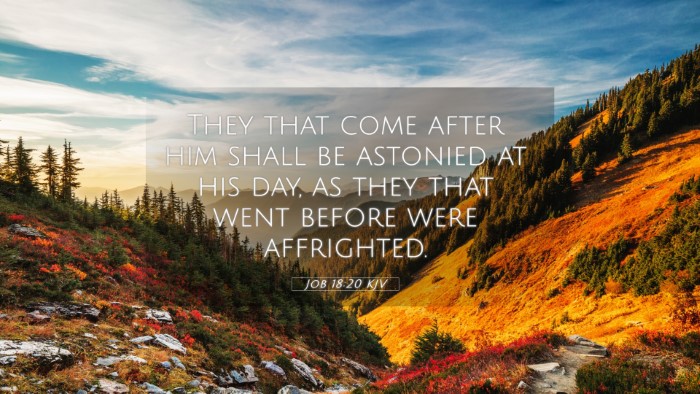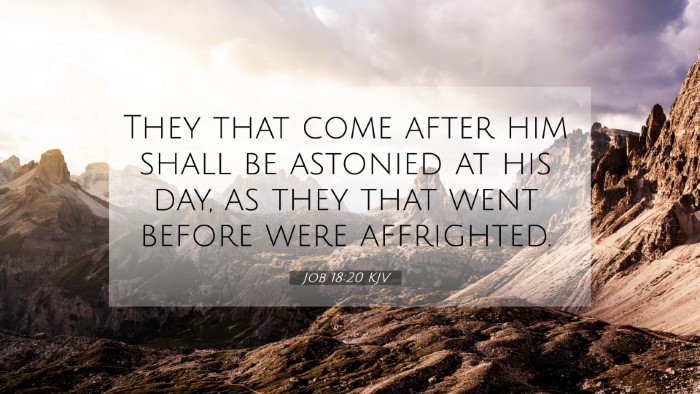Old Testament
Genesis Exodus Leviticus Numbers Deuteronomy Joshua Judges Ruth 1 Samuel 2 Samuel 1 Kings 2 Kings 1 Chronicles 2 Chronicles Ezra Nehemiah Esther Job Psalms Proverbs Ecclesiastes Song of Solomon Isaiah Jeremiah Lamentations Ezekiel Daniel Hosea Joel Amos Obadiah Jonah Micah Nahum Habakkuk Zephaniah Haggai Zechariah MalachiJob 18:20 Similar Verses
Job 18:20 Cross References
They that come after him shall be astonied at his day, as they that went before were affrighted.
Uncover the Rich Themes and Topics of This Bible Verse
Listed below are the Bible themes associated with Job 18:20. We invite you to explore each theme to gain deeper insights into the Scriptures.
Job 18:20 Cross Reference Verses
This section features a detailed cross-reference designed to enrich your understanding of the Scriptures. Below, you will find carefully selected verses that echo the themes and teachings related to Job 18:20 KJV. Click on any image to explore detailed analyses of related Bible verses and uncover deeper theological insights.

Ezekiel 21:25 (KJV) »
And thou, profane wicked prince of Israel, whose day is come, when iniquity shall have an end,
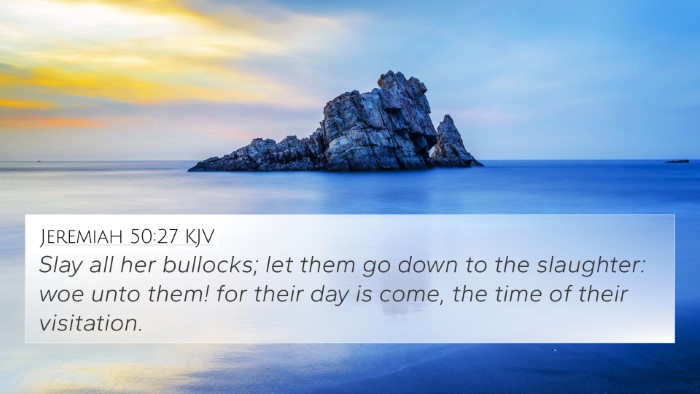
Jeremiah 50:27 (KJV) »
Slay all her bullocks; let them go down to the slaughter: woe unto them! for their day is come, the time of their visitation.

Deuteronomy 29:23 (KJV) »
And that the whole land thereof is brimstone, and salt, and burning, that it is not sown, nor beareth, nor any grass groweth therein, like the overthrow of Sodom, and Gomorrah, Admah, and Zeboim, which the LORD overthrew in his anger, and in his wrath:

Luke 19:42 (KJV) »
Saying, If thou hadst known, even thou, at least in this thy day, the things which belong unto thy peace! but now they are hid from thine eyes.
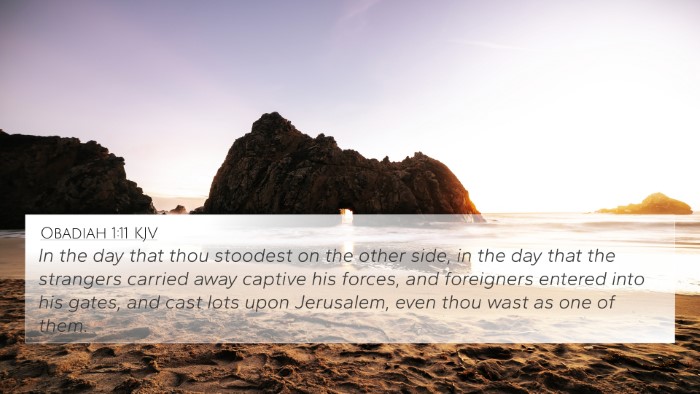
Obadiah 1:11 (KJV) »
In the day that thou stoodest on the other side, in the day that the strangers carried away captive his forces, and foreigners entered into his gates, and cast lots upon Jerusalem, even thou wast as one of them.

Jeremiah 18:16 (KJV) »
To make their land desolate, and a perpetual hissing; every one that passeth thereby shall be astonished, and wag his head.
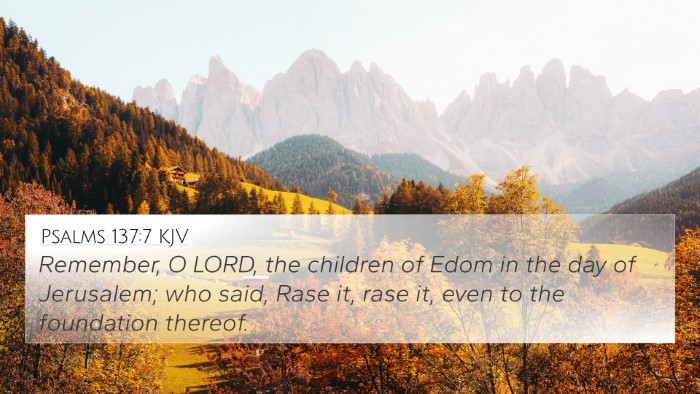
Psalms 137:7 (KJV) »
Remember, O LORD, the children of Edom in the day of Jerusalem; who said, Rase it, rase it, even to the foundation thereof.

Job 19:13 (KJV) »
He hath put my brethren far from me, and mine acquaintance are verily estranged from me.
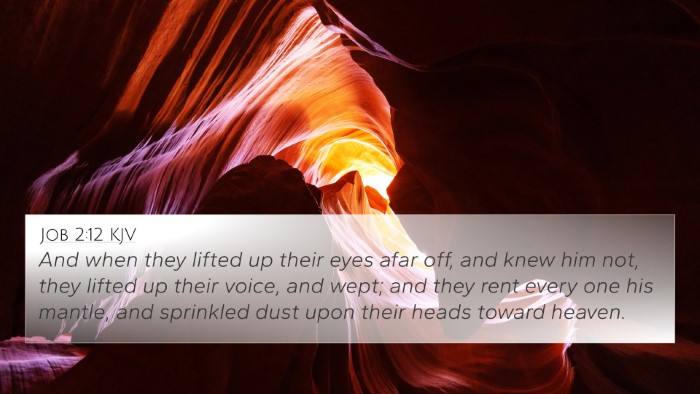
Job 2:12 (KJV) »
And when they lifted up their eyes afar off, and knew him not, they lifted up their voice, and wept; and they rent every one his mantle, and sprinkled dust upon their heads toward heaven.
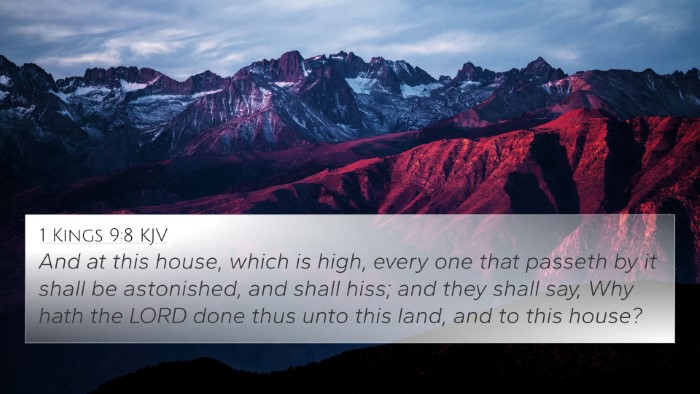
1 Kings 9:8 (KJV) »
And at this house, which is high, every one that passeth by it shall be astonished, and shall hiss; and they shall say, Why hath the LORD done thus unto this land, and to this house?
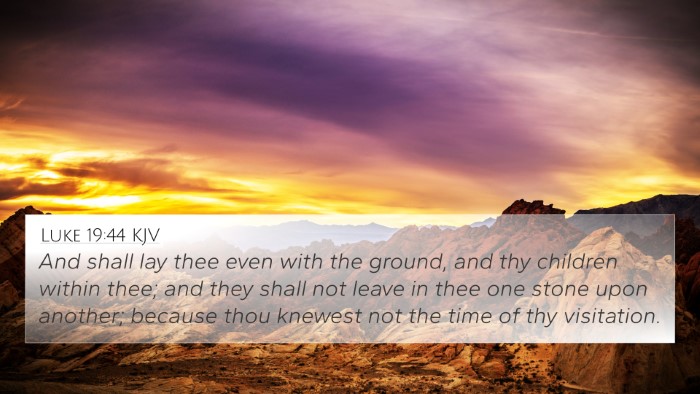
Luke 19:44 (KJV) »
And shall lay thee even with the ground, and thy children within thee; and they shall not leave in thee one stone upon another; because thou knewest not the time of thy visitation.
Job 18:20 Verse Analysis and Similar Verses
Understanding Job 18:20
Job 18:20 states: “They that come after him, or are left behind, shall be astonished at his day: as they that went before were affrighted.” This verse is a poignant reflection on the fate of the wicked and the consequences of their actions, emphasizing the inevitability of divine judgment.
Summary and Interpretation
This verse serves as a declaration of the fate that awaits those who lead lives filled with sin and defiance against God. As Job speaks about the astonishment and fear that will strike those who witness the calamity of the wicked, we are prompted to reflect on the broader themes of justice and retribution that permeate the Scriptures.
Key Insights from Public Domain Commentaries
- Matthew Henry’s Commentary highlights that the fear of judgment serves as a reminder for those who witness the downfall of the wicked. He explicates that the observation of their ruin stirs a sense of awe and terror about the consequences of sin, enhancing the moral gravity present in the text.
- Albert Barnes connects this verse to the overarching themes in the Book of Job. He posits that Job’s friends misinterpret suffering as a unique punishment from God, neglecting the complexity of divine justice. Barnes notes that Job here indicates a broader view of calamity faced by the wicked, which goes beyond mere personal experience.
- Adam Clarke elaborates on the communal aspect of this amazement—how the astonishment is not only personal but collective. Clarke's interpretation suggests that as generations pass, there is an awareness of these divine principles, highlighting the enduring nature of God's justice throughout history.
Bible Verse Connections
This verse can be richly understood through its connections with other scriptures that explore similar themes of divine judgment and the consequences of wickedness. Below are several relevant cross-references:
- Psalm 37:10-11 - "For yet a little while, and the wicked shall not be: yea, thou shalt diligently consider his place, and it shall not be." This passage reinforces the fleeting nature of the wicked's existence and the ultimate triumph of the righteous.
- Proverbs 14:32 - "The wicked is driven away in his wickedness: but the righteous hath hope in his death." This illustrates the stark difference between the end of the wicked and that of the righteous, paralleling Job's sentiments.
- Isaiah 3:11 - "Woe unto the wicked! it shall be ill with him: for the reward of his hands shall be given him." This verse directly addresses the fate of the wicked, emphasizing the certainty of their downfall.
- Matthew 13:41-42 - "The Son of man shall send forth his angels, and they shall gather out of his kingdom all things that offend, and them which do iniquity; and shall cast them into a furnace of fire..." This New Testament reference echoes the themes of divine retribution against wickedness.
- Revelation 20:15 - "And whosoever was not found written in the book of life was cast into the lake of fire." A vivid imagery of God's final judgment on the wicked, resonating with Job’s assertion of astonishment at their fate.
- Jeremiah 25:30-31 - "Therefore prophesy thou against them all these words, and say unto them, The LORD shall roar from on high..." The fierce judgment of God upon sinners mirrors the fear that Job describes in his verse.
- Hebrews 10:31 - "It is a fearful thing to fall into the hands of the living God." This New Testament epistle highlights the terror associated with divine judgment, akin to the earlier sentiments expressed in Job 18:20.
- Ecclesiastes 8:13 - "But it shall not be well with the wicked, neither shall he prolong his days, which are as a shadow; because he feareth not before God." This verse underlines the suffering and shortened lives of the wicked, tying back to Job’s words.
Thematic Bible Verse Connections
In studying Job 18:20, we see a thematic resonance with other scriptures that address the themes of judgment, fate, and the fear of God. Both the Old and New Testaments provide insights into the gravity of sin and its repercussions:
- Judgment: Not only are the wicked judged, but their legacy serves as a warning to future generations.
- Awareness of the Divine: The fear and astonishment described are a microcosm of a larger understanding of God's omnipotence and justice.
- Community Reflection: As believers, the observations of the fate of others often lead to self-reflection and a deeper understanding of personal righteousness.
Cross-Referencing Biblical Texts
The exploration of Job 18:20 taps into the richness of scriptural cross-referencing, allowing readers to observe the interconnectedness of biblical teachings:
- Use of a Bible concordance can help trace these cross-references effectively.
- A Bible cross-reference guide proves beneficial for thematic studies and sermon preparations.
- Engaging in Bible cross-reference systems allows for deeper exegetical work, enhancing understanding of passages.
Tools for Comparative Bible Verse Analysis
To aid in studying thematic connections and cross-referencing methodologies, the following tools may be beneficial:
- Bible reference resources serve as a foundation for connecting disparate verses.
- Bible chain references provide a structured approach to understanding scriptural themes through specified links.
- Comprehensive Bible cross-reference materials can streamline your study, highlighting direct parallels and thematic relevance.
Conclusion
The exploration of Job 18:20 unveils profound insights into the nature of divine judgment and the moral implications of one’s life choices. Through a careful examination of its connections with other scripture, we deepen our understanding of the biblical narrative and the inter-Biblical dialogue that spans both Testaments. This approach not only enhances our exegetical skills but also enriches our spiritual journey as we navigate the scriptural landscape.

